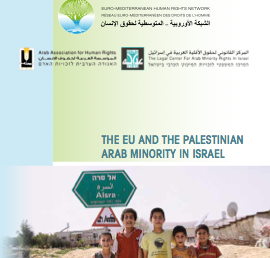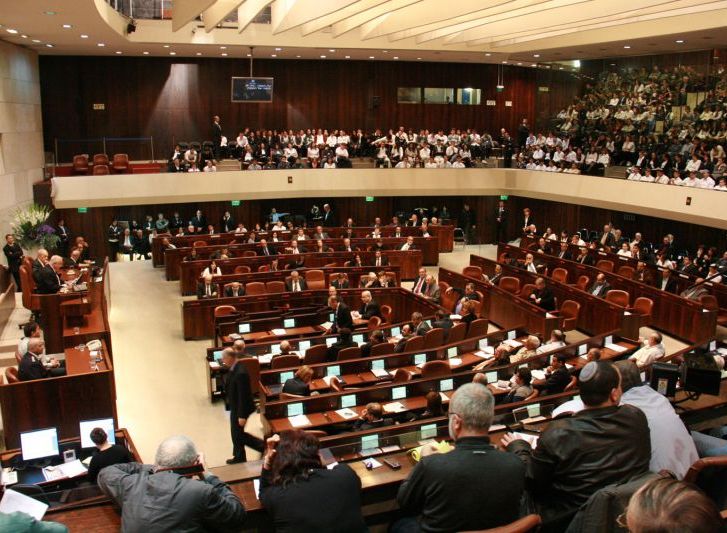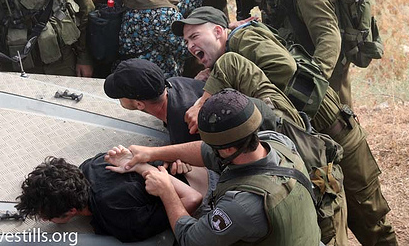Adalah spotlights top five 2016 human rights concerns for Palestinian citizens of Israel
To mark International Human Rights Day (10 December) and as 2016 comes to a close, Adalah wishes to take the opportunity to draw your attention to some of its major concerns regarding the human rights of Palestinian citizens of Israel as we encountered them during the past year, and as we look forward to 2017. Your attention to these issues is critical at a time when Israeli government officials – including Prime Minister Netanyahu – have been emboldened by political developments in the US, in Europe, and locally to take severe, anti-democratic measures against Palestinian citizens of Israel and to incite against them as a ‘fifth column’.
1. Forced displacement. The expected return of the “Prawer Plan” and the Supreme Court’s final decision to uphold the state’s plan to demolish and evacuate the Bedouin village of Atir–Umm al-Hiran in the Naqab (Negev). In November 2016, the state sent bulldozers to raze a number of houses in the village, but the demolition was ultimately thwarted – for the time being – by the presence of human rights activists, Arab Members of Knesset, and international journalists.
- Report on the dangerous implications of the Israeli Supreme Court’s decision
- Adalah’s press release on the attempted demolition
To follow in 2017: The state is expected to submit a new version of the “Prawer Plan”, with accompanying legislation, now dubbed the “Ariel Plan”, for the dispossession and displacement of the Bedouin living in the unrecognized villages in the Naqab.
2. Discriminatory and anti-democratic laws. The Knesset continued to enact discriminatory and anti-democratic laws, much of which entrenches further “securitization” over the protection of human rights. New legislation from 2016 that negatively affects the rights of Palestinian citizens of Israel includes the “Expulsion of MKs” Law, which allows a majority of members of Knesset (MKs) to oust a serving MK, and the draconian new Anti-Terror Law, which Adalah fears will be used to suppress and criminalize legitimate political protest and humanitarian and cultural activities by Palestinian citizens of Israel.
To follow in 2017: The implementation of the new laws, and a new bill to expand the Defense Minister’s authority to order administrative detention of citizens for up to six months, among others.
3. “Shoot to Kill” policy. Following a decision to relax the Israeli police’s open-fire regulations in late 2015, Israel continued to implement a “shoot to kill” policy against Palestinians, and failed to provide accountability or redress in suspected cases of extrajudicial executions (EJEs) involving both Palestinian citizens of Israel and Palestinian residents of the OPT. The police were forced to reveal primary sections of the new regulations in June 2016 in response to a court petition filed by Adalah. In November, the District Court ruled that the regulations must be disclosed to the public in full; this decision is pending appeal by the state.
- Report on Israel’s use of EJEs against Palestinians
- Adalah’s press release on the partial publication of the regulations
To follow in 2017: The Israeli security forces may continue to commit EJEs of Palestinians with impunity; a final court decision on the full publication of the open-fire regulations.
4. Gaps in education and employment. Large gaps in education and employment opportunities for Palestinian children and women citizens of Israel compared with their Jewish Israeli counterparts persisted, due to the lack of effective remedial measures by the state and its continued prioritization of the wellbeing of Israeli Jewish citizens. Institutionalized discrimination is manifested, e.g., in the fact that just 25% of Bedouin 3-4-year-olds in the Naqab attend preschools, and in the employment rate among Palestinian women in Israel, which also stands at just 25%.
- Adalah’s pre-sessional NGO report to the UN CEDAW Committee
- Adalah’s intervention to the OECD on inequalities in education in Israel
- Adalah’s press release on its petition demanding access to preschools for Bedouin children
To follow in 2017: Israel is scheduled to undergo a full review by the CEDAW Committee in Oct/Nov 2017, followed by Israel’s 3rd Universal Periodic Review in Jan 2018 (NGO reports due in June 2017).
5. Closing civil society space. The space for civil society in Israel continued to close in 2016 with further restrictions on human rights NGOs and HR defenders. The new NGO Foreign Funding Law aims to limit the operation and financing of HR NGOs, for example. In addition to right-wing organizations, Israeli officials including PM Netanyahu, Defense Minister Lieberman, and then-Defense Minister Ya’alon all launched vicious attacks on HR NGOs in order to further delegitimize them. Culture Minister Regev has also proposed massive cuts in state funding to cultural institutions (e.g., similar to the Nakba Law passed in 2011) unless they prove their loyalty to the state, which imposes a “chilling effect” on expression. Meanwhile, the police’s use of excessive force and harassment against demonstrators and a growing number of “Facebook arrests”, particularly of Palestinian citizens of Israel and Palestinian residents of East Jerusalem, has also had a chilling effect on political protests on the streets and freedom of expression more broadly.
- Adalah’s letter and press release on the enactment of the NGO Foreign Funding Law
- Adalah’s press release on illegal practices of police regarding Arab citizens’ right to protest
- Adalah’s press release against bill requiring declaration of loyalty by cultural centers
To follow in 2017: Potential security crackdowns on protestors, political activists and human rights defenders commemorating the 50th anniversary of the Israeli occupation.

















